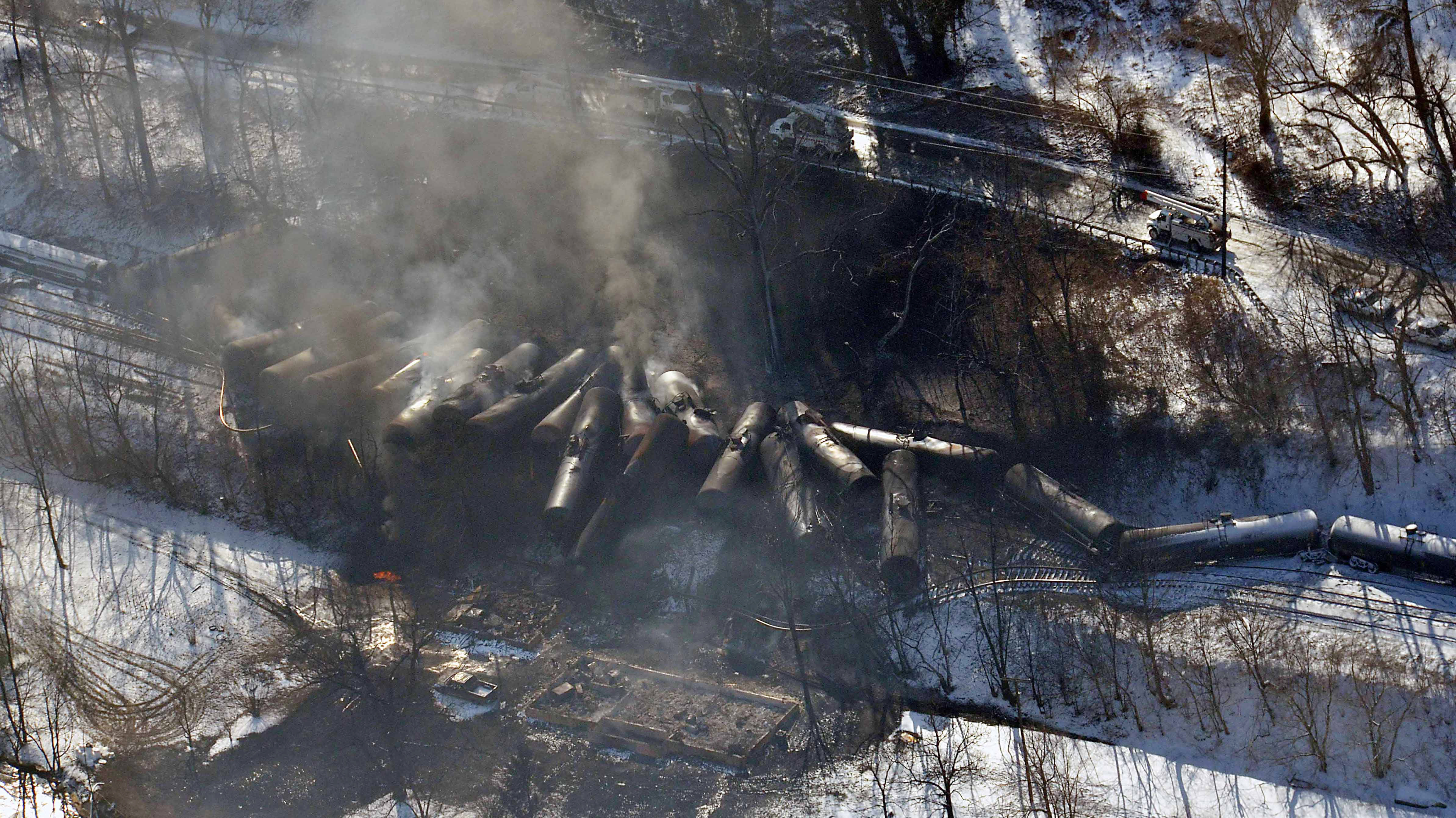In the past four weeks, there have been four train derailments, four explosions, and four terrifying examples of communities and lives at risk from crude oil trains. As a consequence, crude oil has spilled into waterways, potentially contaminating drinking water, hundreds of people have had to evacuate their homes, and fires have burned for days.
With so many derailments and explosions from crude oil trains, it seems like train car disasters are the new normal. But why? An exponential increase in oil extraction via fracking in North Dakota has led to a surge of crude oil travelling by rail in recent years. This extreme form of energy extraction produces highly flammable and explosive oil that simply can’t be transported safely, yet more and more is moving through our communities every day. A lack of publicly available information on crude by rail, weak federal oversight, and limited emergency planning only add to the problem.
However, there is good news: states and cities across the country are responding to citizens’ concerns, and taking action to shed light on this dangerous practice.
Now Maryland is joining in the fight. Delegate Clarence Lam (D-12) is the lead sponsor of House Bill 1073, which addresses some of the problems listed above. This bill was introduced in response to recent derailments and the potential threat of a new crude oil shipping terminal in Baltimore, proposed by Texas-based Targa Resources. If the terminal is approved, the city of Baltimore and rail communities throughout Maryland could face a new surge of over a million gallons of explosive crude oil every day, which you can read more about in my previous blog post. The bill would require Maryland state agencies to study risks and impacts in the event of a crude oil spill during rail transport. On top of that, the bill would also require rail companies to disclose the amounts and routes of crude oil transport throughout the state, something rail companies are currently suing the state of Maryland to keep secret.
The bill so far has received a broad array of support from community members, neighborhood associations, Democrats, Republicans, railroad employees, and environmental groups alike. Last Wednesday, during a hearing in Annapolis, I testified in favor of the bill, along with Delegate Lam, Ana Rule (a PhD researcher at Johns Hopkins), and Will Fadely from Clean Water Action. The bill garnered no testimony in opposition.
With oil train disasters happening on a seemingly weekly basis, it’s clear that urgent action should be taken. This bill is a common-sense first step forward to shed light on the risks in Maryland. It’s not a question of what to do “if” a crude oil train derails and explodes, it’s a question of “when” a train derails and explodes in Maryland, where would it happen, and how can we make sure all emergency responders are prepared.
Of course, we are continuing to work as hard as we can to make sure crude oil doesn’t flow through Baltimore. At a minimum, if passed, Del. Lam’s bill will give citizens, elected officials, and emergency responders basic information about the scope of the risks.
Click here to keep up the pressure on the Baltimore City Council and Mayor Stephanie Rawlings-Blake: Keep Crude Oil out of Baltimore!
Bomb Trains: Baltimore’s Next Big Fight
I was taking the short drive in Baltimore from Locust Point to Fort McHenry after meeting with a CCAN activist at a local coffee shop. “It’s worth taking 5 minutes to breath in the history of this part of the city,” she said. “It’s where the Star Spangled Banner was written, it’s where American troops fought off the British to protect the city of Baltimore in the War of 1812.” Crossing the bridge onto Fort McHenry, it’s also where I saw first hand the size and scope of Baltimore’s next big fight: hundreds of DOT-111 (Department of Transportation) trains, or “soda cans on wheels” in the rail yard on Locust Point, potentially carrying explosive North Dakota crude oil or toxic Alberta tar sands.
Transport of Bakken crude oil has been poorly regulated and, subsequently has had an abysmal track record when it comes to safety and environmental destruction. Most crude oil is transported on outdated DOT-111 trains from the fracking fields of North Dakota or the tar sands in Alberta, Canada — crossing cities, rural towns, state parks, watersheds, aquifers, and mountains; all travelling thousands of miles to finally get to refineries. Sometimes, a wheel slips off the track, and that can cause a derailment, which usually punctures the tank. This inevitably causes an oil spill, and easily ignitable Bakken crude oil explodes. When that happens, the resulting explosions look like what nightmares are made of.

Tragically, it was only after a massive explosion in Canada, that killed 47 people and leveled a town, that federal regulators decided to take action to propose rules to make crude oil transport safer. Yet, even after massive amounts of environmental destruction, dangerous DOT-111 trains still carry crude oil throughout our country. “Most of the explosive crude oil on U.S. rails is moving in tanker cars that are almost guaranteed to fail in an accident,” says Earthjustice attorney Patti Goldman, who is currently litigating against the Department of Transportation after failing to ban DOT-111 trains from current use.
Now, oil companies are trying to use Baltimore and the Chesapeake Bay as a throughway to ship Bakken crude and Alberta tar sands to refineries along the East Coast. A Texas based company called Targa Resources is proposing to retrofit an industrial shipping terminal in Curtis Bay to ship over 9 million barrels of oil per year, which equates to over a million gallons of crude oil every day. That means hundreds of DOT-111 “bomb trains” traveling through Baltimore City neighborhoods every year.
Is it worth having these travel through Baltimore? No way. The risks drastically outweigh the meager, if any, benefits, especially with so many unknowns. Currently, there has been no study on safety impacts, environmental health impacts, economic impacts, or train traffic impacts that Targa’s proposed shipping terminal would have on city of Baltimore. Rail companies are even refusing to disclose the routes that crude oil would travel through the city, going so far as suing state regulators to keep this information secret.
But, there is a solution — we can put pressure on the Baltimore city council to halt local permits on Targa’s facility, effectively passing a moratorium on increased crude oil trains through Baltimore, until environmental, safety, economic, and traffic impacts are studied and this information becomes available to the public. The public has a right to know what is traveling through their neighborhoods.

We need to act fast to keep our city safe — and already, we’re gaining real momentum. Since launching our campaign in October, we’ve held two town hall meetings, packed a public hearing, collected hundreds of public comments to the Maryland Department of the Environment, met with City Councilmembers, and petitioned all throughout Baltimore neighborhoods to raise awareness of this dirty and dangerous plan. We’ve even been featured on the front page of the Baltimore Sun!
We don’t need to wait until a tragedy happens in the city of Baltimore for the city council to take action. They can and should take action right now to protect their constituents.
First, sign this petition to your City Councilmember and Mayor Rawlings-Blake here. Then, sign this public comment to the Maryland Department of the Environment. Finally, fill out this volunteer sign up page, and we’ll get in contact. Together, we will be ready to take on Baltimore’s next big fight. No Explosive Oil Trains!


